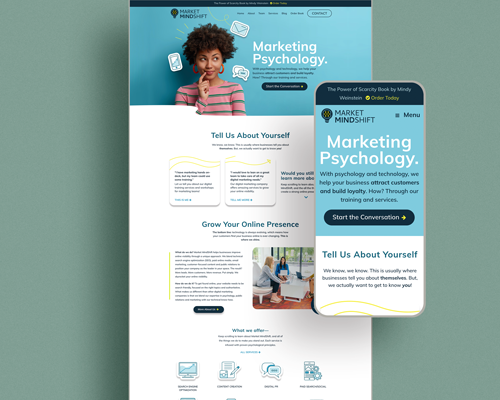Key Considerations for Marketing Healthcare Businesses
Marketing a healthcare business requires a unique approach that balances professional credibility, compassion, and clear communication. The competitive healthcare market in 2025 demands strategies that build trust, connect with patients, and comply with regulations. Here are the key considerations for creating an effective marketing plan for healthcare businesses.

1. Understand Your Target Audience
Successful healthcare marketing begins with a deep understanding of your target audience. Consider demographics such as age, income, location, and health concerns. Additionally, take into account psychographics like values, behaviors, and motivations.
Pro Tip: Create detailed patient personas to tailor your messaging and campaigns to address their specific needs and concerns.
2. Build Trust with Credibility and Expertise
Trust is critical in healthcare marketing. Highlight your credentials, certifications, and years of experience to establish authority. Use patient testimonials, case studies, and success stories to showcase the real-world impact of your services.
SEO Tip: Optimize your website content with terms like “trusted healthcare provider” or “board-certified specialists” to emphasize credibility.
3. Optimize Your Online Presence
Your website is often the first interaction potential patients have with your brand. Ensure it is mobile-friendly, fast-loading, and user-friendly. Patients should be able to easily find information, schedule appointments, or contact your team.
SEO Best Practices:
- Use location-based keywords like “top dentist in Detroit.”
- Incorporate clear calls-to-action (CTAs) like “Book an Appointment” or “Contact Us Today.”
4. Leverage Content Marketing
Educating your audience is a powerful way to build trust and attract patients. Create content that addresses common health concerns, answers frequently asked questions, and provides valuable insights.
Examples of Effective Content:
- Blog posts on health tips, such as “5 Signs You Should See a Chiropractor.”
- Informational videos on procedures or services.
- Downloadable guides or eBooks, like “Your Complete Guide to Managing Back Pain.”
SEO Tip: Use long-tail keywords related to your specialties, such as “how to treat seasonal allergies.”
5. Embrace Local SEO
Most healthcare services are location-based, making local SEO essential. Optimize your Google Business Profile (formerly Google My Business) with accurate contact information, service areas, and operating hours. Encourage satisfied patients to leave reviews, as positive feedback significantly impacts local search rankings.
Local SEO Strategies:
- Include location-specific pages on your website (e.g., “Family Medicine in Grand Rapids”).
- Use schema markup to help search engines understand your business details.
6. Comply with Regulations
Healthcare marketing must comply with strict regulations, such as HIPAA in the United States. Ensure your marketing practices safeguard patient privacy and do not make misleading claims.
Compliance Tips:
- Avoid using patient photos or testimonials without explicit consent.
- Ensure email marketing campaigns comply with data privacy laws.
7. Focus on Patient-Centered Messaging
Healthcare marketing should emphasize empathy and patient benefits. Use messaging that focuses on how your services improve quality of life, resolve concerns, or address pain points. For example, instead of saying, “We offer state-of-the-art MRI services,” you could say, “Get fast and accurate diagnostic results with our advanced MRI technology.”
SEO Tip: Use conversational keywords that reflect how patients search, like “where can I find a caring pediatrician?”
8. Utilize Social Media
Social media platforms offer a unique opportunity to humanize your healthcare brand. Share content that educates, inspires, or engages your audience, such as behind-the-scenes looks, health tips, or success stories. Use social media to answer patient questions and create a sense of community.
Best Practices:
- Post consistently to stay top-of-mind with followers.
- Use platform-specific strategies (e.g., visual content on Instagram, informative posts on Facebook).
9. Measure and Adjust Campaigns
Data-driven marketing is essential for success. Use analytics tools to track key performance indicators (KPIs) such as website traffic, appointment bookings, and patient acquisition rates. Regularly evaluate your campaigns and make adjustments based on what’s working.
KPIs to Monitor:
- Conversion rates from landing pages.
- Engagement rates on social media.
- Search rankings for targeted keywords.
10. Build Relationships Through Email Marketing
Email marketing remains one of the most effective ways to nurture relationships with current and potential patients. Send newsletters with health tips, updates on services, or seasonal reminders, such as flu shot availability.
Email Marketing Tips:
- Segment your email lists based on patient needs or interests.
- Use personalized subject lines to increase open rates.
Conclusion
Marketing for healthcare businesses requires a unique blend of trust-building, patient-centric communication, and compliance with regulations. By focusing on local SEO, content marketing, and data-driven strategies, you can effectively connect with your audience and grow your practice.
At Mash Creative Co., we specialize in crafting tailored marketing strategies for all types healthcare businesses, whether you’re a dental office or an urgent care. From help with branding, SEO, or social media, we’re here to help you achieve your goals. Let’s work together to create a marketing plan that drives results!



